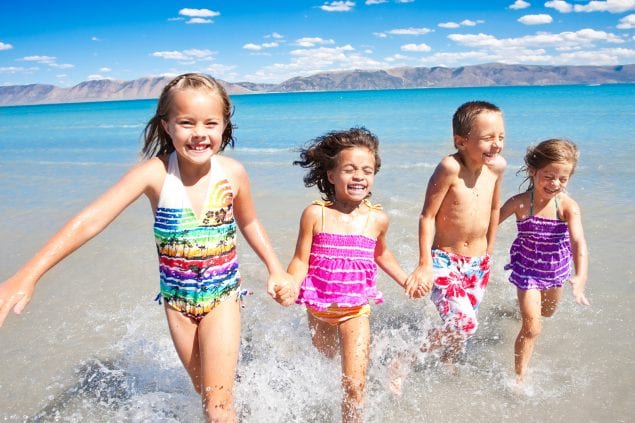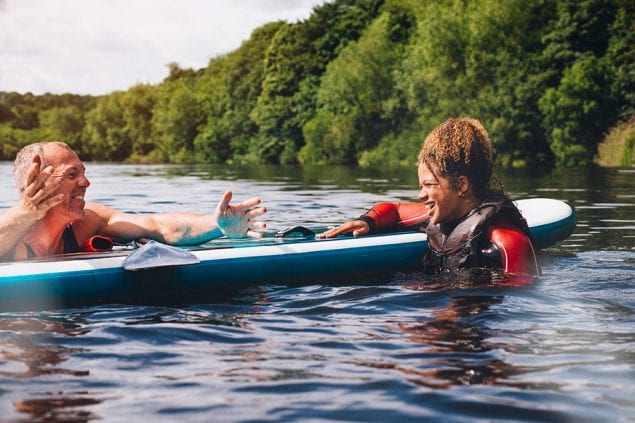Visiting Oceans, Lakes, and Rivers

Spending time in natural bodies of water—like oceans, lakes, and rivers—is a great way to enjoy the outdoors with family and friends. While this can help you stay active, it is important to know that the water we swim, play, wade, and relax in can also spread germs and make you, and those you care about, sick.
Germs found in the water and sand (swim area) often come from human or animal feces (poop). One way germs can be carried into swim areas is by heavy rain. Water from heavy rain picks up anything it comes in contact with (for example, poop from where animals live) and can drain into swim areas. These germs can also come from humans or animals pooping in or near the water.
Water contaminated with these germs can make you sick if you swallow it. It can also cause an infection if you get into the water with an open cut or wound (especially from a surgery or piercing).
Taking a few simple steps when you visit oceans, lakes, rivers, and other natural bodies of water can help protect everyone from these germs.
Know before you go
- Before you head out, check online to find out if the swim area is currently monitored, is under advisory, or has been closed for health or safety reasons. This is especially important after a heavy rain.
- If your body’s ability to fight germs is already affected by other health problems or medicines, check with your healthcare provider before swimming in oceans, lakes, rivers, and other natural bodies of water.

Stay out of the water if
- Signs say the swim area is closed.
- This may be due to high levels of germs in the water which make it unsafe for swimming.
- The water looks cloudier than usual, is discolored, or smells bad. Cloudy water can be a warning that there are more germs in the water than normal. Discolored or smelly water could mean there is a harmful algal bloom (HAB) in the water.
- Heavy rain picks up anything it comes in contact with (for example, human and animal poop). This rainwater can drain into the swim area, making the water cloudier.
- Harmful algal blooms in the water can make humans and animals sick.
- You see any pipes draining into or around the water.
- Water in pipes can pick up animal or human poop and bring germs into the swim area, especially after heavy rains or rainfalls after long periods of drought.
- You are sick with diarrhea.
- Germs in diarrhea can get in the water and make other swimmers sick if they swallow the contaminated water.
- You have an open cut or wound (especially from a surgery or piercing). If you do go in the water while a cut or wound is still healing, use waterproof bandages to completely cover
- Germs in the water can get into open cuts or wounds and cause infections.
Creeks and streams often contain harmful germs and may not be monitored for water quality. Swimming or playing in creeks and streams can put you at risk for waterborne illness or infection.
Once you are in the swim area
- Don’t swallow the water.
- Water can contain germs that can make you sick if swallowed.
- Keep sand away from your mouth and children’s mouths.
- Sand can contain germs that can make you sick if swallowed.
- Don’t poop in the water.
- Germs in your poop can make others sick.
- Every hour—everyone OUT—to keep poop and pee out of the water.
- Take kids on bathroom breaks.
- Check diapers. If needed, change them in a bathroom or diaper-changing area to keep germs away from the water and sand.
- Wash your hands for 20 seconds before eating food, especially if you have been playing in or touching sand.
- If soap and water are not available, use an alcohol-based hand sanitizer that contains at least 60% alcohol. Hand sanitizer might not be as effective when hands are visibly dirty or greasy, so wiping sand off before using it might be helpful.

- Outbreaks Associated with Untreated Recreational Water
- Naegleria fowleri (parasite also referred to as the “brain-eating ameba”)
- Harmful Algal Blooms
- Vibrio vulnificus & Wounds
- Drowning Prevention
- Beach Health